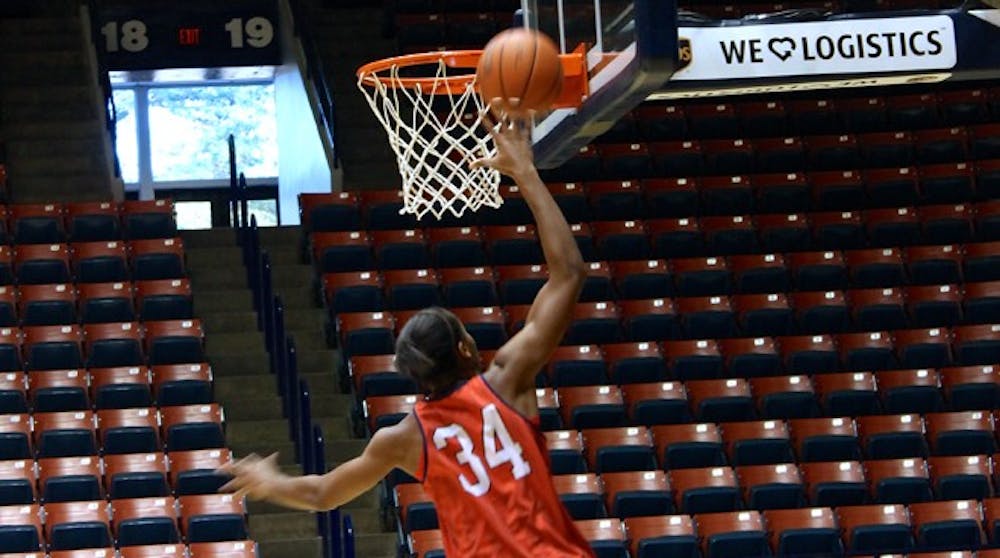The University of Connecticut's head women's basketball coach, Geno Auriemma, is proposing that the rim for women's collegiate basketball be lowered seven inches.
Auriemma has won seven NCAA championships, 19 Big East Regular Season Championships and a gold medal, coaching the women's 2012 Olympic basketball team.
Auriemma announced the idea in an article in The Hartford Courant, stating that there would be fewer missed layups because the players would be closer to the rim when shooting. The change will bring fans back to the game, he said.
"I think what Geno wants to do is attract more fans and improve our game," Richmond women's basketball head coach, Michael Shafer said. "I think I know where he's coming from, but if something were to change, we'd need substantial evidence that it would increase the audience and fan base."
Auriemma plans to propose his idea to the NCAA rules committee members in the spring of 2013. Shafer is one of the three Division I coaches on the committee who will consider the proposal.
"There will certainly be some challenges when we meet," Shafer said. "I will personally need empirical data to suggest that the game improves. But first of all, the players have to enjoy it, too."
Women's basketball needs more fans, but she is against lowering the rim to get them, Samantha Bilney, a forward on Richmond's women's varsity basketball team, said.
"It would completely change the way the game is played," she said, "like changing the shape of the basketball to that of a football. And I don't think it would make much of a difference in terms of our audience at games."
In Auriemma's proposal, he stated similar differences between other men's and women's sports, particularly the height of the net in volleyball and the size of the diamond in softball and baseball. The height of the net in women's volleyball is seven inches lower that that in men's volleyball.
The average height difference between men's and women's basketball players is seven inches, Shafer said.
"I think that's the reason behind lowering the rim, so it would be 9 feet 5 inches high as opposed to the regulation 10 feet," he said.
When I first heard about it, I thought it was a little outrageous, Bilney said.
Enjoy what you're reading?
Signup for our newsletter
"I've been playing for a long time, and for me to change my shot," she said, "it would just be completely different."
The rules under the NCAA for women's basketball not only affect colleges, but high schools as well. Many high schools have fixed rims that hang at the regulation height from a wall or ceiling.
"If this change was to happen, it would take years to implement," assistant coach Ginny Doyle said.
Shafer suspects it would take at least two to three years to change the rule.
"But even after changing it, to actually go through logistically and financially to make it happen would take much longer," he said.
Both high school and college facilities with fixed rims would have to invest in either another gym for the women's game or portable rims, similar to what the Robins Stadium has, Shafer said.
Members of Richmond's women's basketball team seem to have mixed reactions to the proposal.
"It could make the game more entertaining," said Amber Nichols, a guard for the women's team. "It would probably increase the percentage of girls that could dunk, which is what the crowd wants."
But Doyle is not sure that this will increase the number of women who can play above the rim.
"Even if the rim was lowered seven inches, the average height for women who play basketball is 5 feet 11 inches," Doyle said. "I still don't think the majority would be able to play above the rim."
Women's basketball doesn't need dunking to make it great, Bilney said.
"I'm all for finding creative ways to bring crowds, but I don't think women want help to play above the rim," she said. "I honestly think players would make a lock-out if this were to be accepted by the committee.
"By the time female athletes make it to a higher level of the sport, we are very proud of our progress. I don't think women would go for lowering the standard of our game."
Both Doyle and Bilney question the extent of changes that would occur if the rim were to be lowered.
There is a possibility that other changes to the rules and the court would have to occur to support lowering the rim, Doyle said.
"I assume that the free throw lines would have to be pushed back or adjusted," she said.
"Players would also have to adapt; shooting guards would have to change their aim and the way they throw the ball."
Doyle isn't convinced that making the changes for the sake of excitement will necessarily draw more crowds.
"There are and will be people, who no matter what is done to make the sport better, will never watch women's basketball," Doyle said. "Some people just don't think it's the same game as men's basketball.
"So making more changes that differentiate it further from the men's game won't necessarily bring more fans."
Contact staff writer Nabila Khouri at nabila.khouri@richmond.edu
Support independent student media
You can make a tax-deductible donation by clicking the button below, which takes you to our secure PayPal account. The page is set up to receive contributions in whatever amount you designate. We look forward to using the money we raise to further our mission of providing honest and accurate information to students, faculty, staff, alumni and others in the general public.
Donate Now



